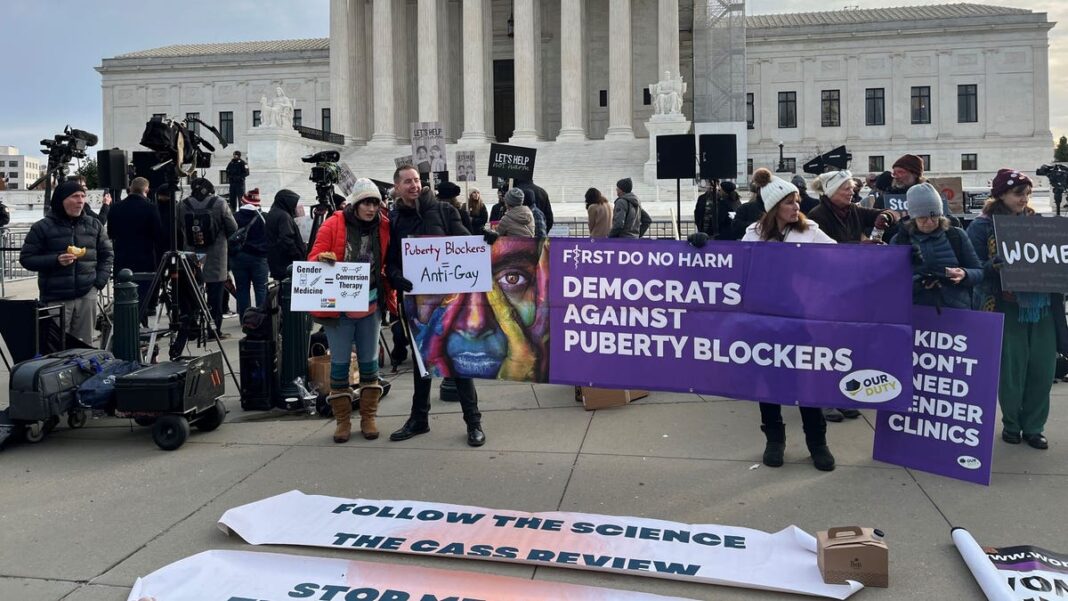Supreme Court Live Updates: Current Developments in Transgender Care Case
The Supreme Court will begin hearing oral arguments today at 10 a.m. regarding whether states can implement restrictions on gender-affirming treatments for minors whose gender identity differs from their sex assigned at birth.
This case represents a crucial episode in the ongoing cultural conflict, where justices will consider Tennessee’s prohibition on puberty blockers and hormone therapy for gender dysphoria, while permitting these treatments for other medical conditions.
Tennessee is one of roughly two dozen states that have enacted such limitations in recent years. The state claims that the risks associated with these treatments outweigh the unproven benefits for transgender youth wanting to delay puberty and achieve physical traits that match their gender identity.
On the other side, the Justice Department and the American Civil Liberties Union—representing families from Tennessee who are challenging the ban—argue that leading medical organizations endorse these treatments as safe and effective. They assert that denying access to them for transgender minors constitutes discrimination.
Stay tuned for the latest updates on this critical discussion:
‘Bodily Autonomy’ at Stake, Says Plaintiff’s Attorney
Ethan Rice, a lawyer from Lambda Legal, which represents the plaintiffs, emphasized that the case fundamentally revolves around “bodily autonomy.” He stated, “It’s about the right to live according to your own choices.” Rice mentioned that “30 years of research” indicates that gender-affirming treatments do not harm children. “What’s at stake here is potentially life-saving healthcare,” he remarked. Rice expressed hope that the justices will adhere to precedents indicating that the ban amounts to sex discrimination. He added, “They need to establish the appropriate standard for addressing sex discrimination cases, not just those concerning transgender individuals.”
— Cybele Mayes-Osterman
‘Queer Trans Joy Is Unstoppable’
A gathering of demonstrators formed outside the court well before the arguments commenced on Wednesday morning. Numerous trans rights advocates rallied on one side of the block, waving rainbow flags and holding signs declaring, “queer trans joy is unstoppable.” In contrast, some protesters opposed to gender-affirming treatments bore signs that read “no child can consent to be sterilized” and “puberty blockers = anti-gay.” A speaker favoring the ban addressed the crowd, claiming “young people have been misled.” The opposing demonstrators responded with music.
— Cybele Mayes-Osterman
Will This Decision Reflect the Court’s Abortion Ruling?
In 2022, the Supreme Court overturned the constitutional right to abortion and indicated that such matters should be decided by legislative bodies rather than the court itself. The justices explained that they lacked the “authority or expertise” to weigh the importance of a fetus against that of a mother.
Judge Jeffrey Sutton quoted similar reasoning in the 6th U.S. Circuit Court of Appeals, which ruled in favor of Tennessee’s law.
Sutton asserted the necessity of caution regarding treatments deemed “still experimental,” warning against restricting legislative decisions with a “constitutional straitjacket.”
In his commentary, Sutton also referenced the Dobbs v. Jackson Women’s Health Organization case regarding abortion, arguing that Tennessee’s law does not constitute sex discrimination, echoing remarks made about abortion regulations.
– Maureen Groppe
Previous Supreme Court Decisions on Transgender Discrimination
A splintered Supreme Court ruled in 2020 that workplace discrimination against gay, lesbian, and transgender employees was unlawful—a significant win for the LGBTQ community.
Justice Neil Gorsuch authored the opinion, which received backing from Chief Justice John Roberts and several liberal justices. However, the ruling was based on the text of a federal civil rights statute, as opposed to the equal protection clause in the Constitution.
In the ongoing case, both parties have presented arguments regarding the relevance of that 2020 decision.
– Maureen Groppe
Current Protections for Transgender Americans in 2024
The Justice Department asserts that transgender Americans have faced long-standing discrimination.
“This hostility appears to be increasing,” they communicated to the court, highlighting a “staggering number of laws” from states that target transgender individuals.
President-elect Donald Trump, who focused on opposing transgender rights during his campaign, expressed intentions to eliminate what he views as “chemical, physical and emotional mutilation of our youth.”
Conversely, Tennessee argues that it’s unrealistic to claim that transgender people lack political influence. The state’s lawyers pointed to various actions taken by the Biden administration to support transgender communities as evidence of their political power.
Tennessee’s representatives stated, “The lack of success on certain issues across different states does not indicate powerlessness.”
– Maureen Groppe
What is the legal issue in this case?
The central question for the court to address is whether the bans are discriminatory based on a person’s sex or transgender identity.
If found to be discriminatory, these bans might still be upheld. However, Tennessee would need to demonstrate that their law supports a significant government interest.
Critics argue that the laws are indeed discriminatory. They point out the inconsistency where a teenager assigned male at birth can receive testosterone for delayed puberty, while a teenager assigned female at birth seeking testosterone for gender dysphoria cannot.
Tennessee argues that the restrictions are based on the intended purpose of the treatments and the age of the patients, rather than on their sex or transgender status, and therefore do not constitute discrimination.
– Maureen Groppe

